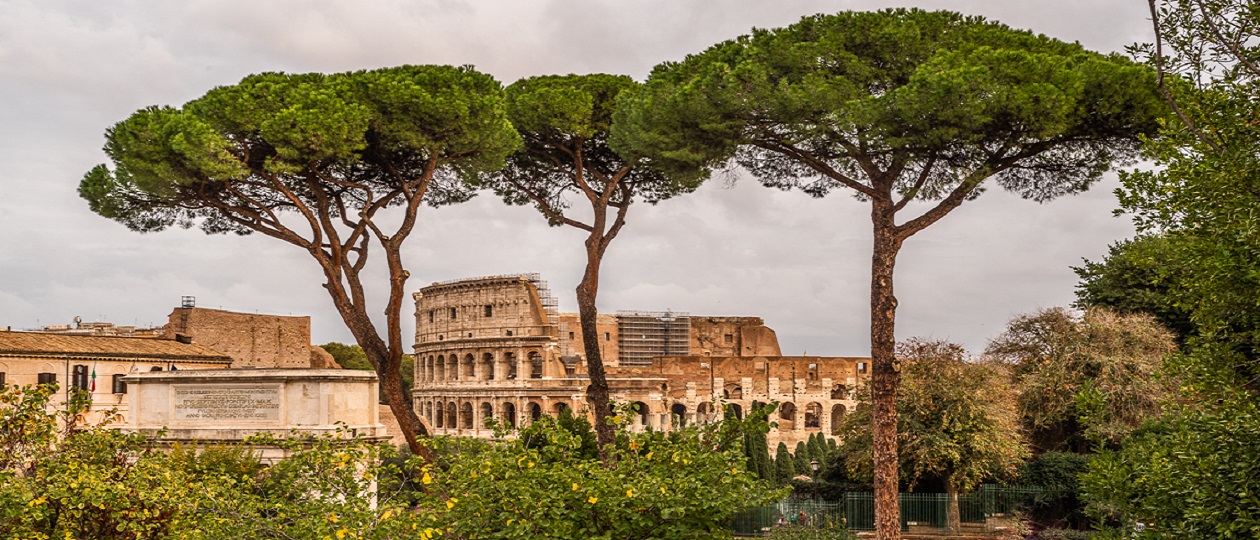
The Romans loved their native soil; they were characteristically oriented toward the land.
Earth, they firmly believed, was mother of all, and they called her mater terra. Never great seafarers, the Romans had found in their earlier history that the rich land of Italy met all their essential needs, and their attitudes toward nature reflect this. The earth may have provided for other nations, but this did not interest the Romans very much. They were confident that the earth of Rome and Italy was the best, being fertile, centrally located, and blessed with an equable climate. More than one Roman author claimed that Rome’s conquest of the Mediterranean world was due to these very factors.
The Roman mind was marked by its practicality, and Roman attitudes toward nature were distinctly utilitarian. The Romans generally believed that the world is here for human use, and they proceeded in a very pragmatic way to find uses for its components. This dominant Roman characteristic is reflected in religion, literature, philosophy, and science. They sought knowledge for its own sake very rarely, always seeming to demand a practical application for intellectual endeavor. Closely allied to practicality was a profound desire for order; this was demonstrated in their view of nature as everywhere else. No other people in ancient times imposed a structure upon their natural environment so rigorous and artificial as Roman centuriation, a geometric system of dividing the land into a checkerboard of squares of equal size, which they used from the Po Valley in the north to Tunisia in the south. The squares are still clearly visible in aerial photographs.
The Roman attitude toward nature reflected Roman religion, which from early times contained a dominant strain of animism, the feeling that spiritual powers manifest themselves in the natural environment. The early Romans were an agrarian people with strong ties to nature, and their religion, being intensely conservative, preserved agricultural and animistic elements even among the city-dwelling populations of later times.
Roman religion always had a strong sense of locality. Certain places seemed to the Romans to be endowed by nature with supernatural powers, or numina. Temples or shrines came to be located in these places, but the divine power was felt to be inherent in the place itself, as part of its natural functions, before any special dedication by men for religious purposes. Ovid spoke of such a place in the Fasti: “Under the Aventine (hill) there lay a grove black with the shade of oaks; at sight of it, you could say, ‘There is a spirit here!’ ” Not only groves, but individual trees, rocks, springs, lakes, and rivers were regarded in this way. The area of volcanic activity near Naples, with its sulfurous caverns, steam vents, hot springs, and shaking ground, was thought to be particularly numinous, and famous oracles were located there.
Natural objects which provoked wonder and respect among the Romans included springs of water like the Fons Bandusiae, subject of one of the odes of Horace, and trees like the arbor felix, under which custom required that the hair shorn from the priest of Jupiter be placed. Groves of trees, as noted above, were regarded as the dwelling places of spirits and, as in Greece, were somewhat protected from damage. For example, horses were excluded from the grove of Diana at Aricia. But Roman practicality asserted itself here, and Cato the Elder records a prayer to be used with the sacrifice of a pig before cutting down trees in a sacred grove, to smooth the ruffled feelings of the god or goddess, whichever it might be, who lived there. A prayer like this one would, of course, lessen the protection extended by religion to a sacred grove. In similar fashion, a sacred stone could be carted away to a more convenient spot, carrying its numen with it.
Roman religion was not without reverence for wild places, forests, and mountains, but it was predominantly agricultural, reflecting the early observances of farm families close to the land who depended on the cycles and changes of nature for survival.
The Roman calendar, therefore, was based upon the agricultural year, and its complicated series of religious festivals was dictated by the round of activities on the ancestral farm, from the hanging of the plow on the boundary marker in the Compitalia in January to the festivals of Saturn and Bona Dea, both deities of the soil, in December. When Virgil addressed his native land of Italy in poetry, he did so with the images of the old agricultural religion:
Hail, great mother of harvests! O land of Saturn, hail! Mother of Men!
Romans always worshiped the great gods of Indo-European polytheism; it can be demonstrated through linguistics that names of gods like Jupiter were brought to Italy with the ancestral Latin language itself. These gods were associated with the natural environment, particularly with the aspects affecting agriculture. For example, Jupiter was regarded as the bringer of rain. But to the gods brought to Italy by the Romans’ linguistic forbears were added many more of local origin. In fact, Roman gods and goddesses became innumerable, and their hierarchy ran from great deities like Diana, goddess of the woodlands and wild creatures, to local spirits of springs like Juturna. The Romans possessed gods of the farmhouse and storehouse-the penates-and of the fields-the lares. Anything that could be given a name seems to have had a deity in charge of it. A god or goddess looked after every major agricultural crop: Ceres was goddess of the growing grain, Liber god of wine, Robigus would protect the crops from diseases, and so forth. Beyond this, every major and minor activity of the farm had a deity who could be propitiated for its success, such as Vervactor for the first plowing, Repacator for the second plowing, Imporcitor for harrowing, Insitor for sowing, and so on, including even Sterculius for manuring. Long lists of such deities have been preserved. On the margins lurked the wild gods of mountains and forests: Silvanus, the fauns, and others.
Roman religion was not much concerned with careful definition of the nature and role of the gods, or with matters of ethics. It was concerned with ritual, and the ritual was designed for a specific practical end, that is, to control the natural environment through enlisting the cooperation of the unseen powers which control it. When a Roman addressed one of his gods, he might use the expression, do ut des, “I give so you will give.” The prayer and sacrifice were offered in order to induce the god to grant a desired result, not simply to honor the god, and certainly not out of love. An offering might be made as a return for a favor already received, or because a previous promise had been made to give the god something if he granted what was desired. Presumably, if the god did not answer such a request, he would get nothing. Efforts to control nature through ritual were highly persistent among the Romans, for whenever they did not succeed, the failure could be blamed on some fault in the ceremony. It was believed that if the person repeating the ritual made any mistakes in words or actions, the ritual would lose its effect and therefore would have to be repeated. Persons whose presence might pollute a sacrifice, such as murderers and most foreigners, had to be excluded. Those present had to observe ceremonial cleanliness and silence.
The Romans sacrificed to the gods only such things as contained the principle of life, and with very few exceptions, only the animals and plants of agriculture and their products. Cakes, fruit, wine, cheese, milk, and other products could be offered, as well as the bloodier sacrifices of pigs, sheep, and oxen, often one of each, representative of the farmer’s herds. In addition to sacrifice and prayer, the Romans practiced a multitude of ritual actions intended to control the environment and drive away evil. Many of these actions amounted to magic, such as circumambulation, which drew a sacred circle around the fields and excluded baneful influences.
Another Roman practice that should be mentioned is divination, which rests on the belief that the natural environment reveals the will of the supernatural powers to people. In particular, the flight and calls of birds, the actions of animals, especially wild animals, and the occurrence of lightning and thunder were observed and interpreted by men skilled in these matters. The internal organs of sacrificial animals, particularly the liver, were examined for unusual markings and shapes. To the Romans as to other ancient peoples, the world was full of gods, and human beings were wise to tread carefully. The feeling that the natural environment is the result of divine arrangements and ought not to be altered unduly or in massive ways lurked in the minds of the common people and produced a conservative attitude in this respect, although it was not strong enough to prevent the execution of many of the spectacular works of engineering planned by the Romans. Tacitus does say that a planned diversion of the waters of the Tiber was halted by the expression of just such feelings, but this was a rare exception.
In religion, as in much else, the Romans felt the deep and pervading influence of the Greeks. At an early time, the Roman gods were identified with Greek gods who seemed roughly similar, and myths of Greek gods were freely ascribed to their Roman counterparts. As the centuries went by, Roman and Greek ideas became inextricably mixed.
Religious influences also reached Rome from Asia Minor, Egypt, and Persia. Astrology in particular, with its implicit theories of environmental determinism, became exceptionally popular in Rome and affected Roman thought about the workings of the natural world. Astrology teaches that human life is determined by the changing positions of the stars and planets. Various zones of the earth are considered to be under the influences of different constellations of the zodiac and planets, which accounts for the differences in peoples and animals found there. Such a system of belief leaves little room for the idea that human beings are capable of producing changes in the natural environment, and thus it tends to make the study of human interaction with nature-or at least that part of nature which occurs on earth-pointless.
Roman literature contains countless celebrations of the beauty of nature, in both its wild and domesticated forms. In fact, this is a dominant and recurring theme. As Pliny the Younger remarked, “There is nothing that gives either you or me as much pleasure as the works of nature.” It must be noted that in this respect the Romans were following a literary tradition of nature description which they had inherited from the Greeks of Alexandria, so that some of their expressions may reflect convention rather than feelings original to the author, but the Romans had their own traditions of agricultural writing going back at least to Cato the Elder. So highly did the Romans regard good writing in this field that the Senate, in ordering the total destruction of Carthage at Cato’s urging, made an exception of the book on agriculture by Mago, a Carthaginian. This was translated from Phoenician into Latin and, although too late to affect Roman practice during its best yeoman phase in the days of Cincinnatus, it did influence the classic Roman writers on agriculture: Cato, Columella, Varro, and Virgil. Literary tradition alone could not explain the richness and variety of nature imagery in Roman writing; most of the authors had really observed nature, and genuinely took delight in the beauty of their natural environment.
To a great extent, Roman writers probably describe scenes which were familiar to them since childhood. “If we have dwelt some time amid mountains and forests we take delight in them,” observed Cicero. Many of the authors had moved to Rome from towns in the Italian countryside, which helps to explain the depth of their feeling for rural settings. A passage from Virgil typifies this kind of landscape description:
“For now the farmhouse gables are smoking in the distance, and larger shadows fall on the lofty mountains.”
In the great age of Latin literature, Rome was highly urbanized, and it became common for Roman writers to draw a contrast between city and country life, stressing the advantages of the latter and vicious effects of the former. It was a genuine conviction among the Romans that rural life was morally and physically superior to urban life. Horace wrote that he disliked going to the city of Rome and wanted to retire to a lovely spot in the country, and Juvenal’s descriptions of the city are positively horrifying in their verisimilitude. In the Georgics, Virgil describes with evident delight the humble pleasures of farming, the round of the seasons, and the duties of the husbandman. There is no such praise accorded to the amenities of the capital city.
The glories of wild nature are also sung by the Roman writers. “May I love the streams and the forests!” Virgil entreats. Elsewhere he describes streams tumbling down rocky canyons, and he loves to name mountain peaks. Although mountains are described in terms of gloom and dread by some Romans, others enjoyed studying them and climbed them to obtain wide views. Lucretius speaks of mountain climbing as a personal experience, Seneca asked Lucilius to climb Etna to make observations for him, and it is recorded that the emperor Hadrian himself climbed Mount Etna and Mount Casius to see the sunrise, and at least one other peak as well. Curiosity and the desire for aesthetic pleasure seem to have been the primary motives for these exploits.
More evidence of Roman enjoyment of nature comes from painting and mosaic art, where artists (probably following Greek models which have been lost) produced outdoor scenes with startling naturalism. The walls and floors of Pompeii and the palaces of the emperors are covered with artists’ renditions of trees, mountains, seascapes, lifelike birds, mammals, and creatures of the sea. Sometimes objects from nature are treated in a highly stylized or grotesque manner, but often the attempt has been made to fool the eye into believing that it is seeing the object itself. Here nature is treated as a background to human life.
In philosophy, the Romans were followers of the Greeks, being influenced by the schools of Plato, Aristotle, and Epicurus, but most of all by the Stoic school founded by Zeno and developed by Chrysippus and others.
The Stoics taught that the natural world represents the design of divine reason. Indeed, according to Stoic pantheism, God not only designed the world but pervades every part of it. He is the soul of the universe. In such a world, everything has its place and purpose. As Cicero says in his explanation of Stoic philosophy:
“Unless obstructed by some force, nature progresses on a certain path of her own to her goal of full development in the world of nature as a whole there must be a process towards completeness and perfection. There can be nothing that can frustrate nature as a whole, since she embraces and contains within herself all modes of Since she is of such a character as to be being. superior to all things and incapable of frustration by any, it follows of necessity that the world is an intelligent being, and indeed also a wise being.”
The world is directed by its own principle of reason, and everything in it has a rational purpose. Plants exist for the sake of animals, animals for the sake of mankind, and mankind exists to contemplate and imitate the perfection of the world. Not all Roman philosophers accepted this view of nature. The Epicureans, represented by the poet Lucretius, held that the world is the result not of design but of chance, a configuration of atoms in the void which is doomed to change and decay.
Animals and plants, some Epicureans held, could not have been created for human use, because so many people are fools, and there is not enough human intelligence in the world to make creation worthwhile. Not many Romans seem to have accepted the Epicurean view that the natural world is driven by chance, essentially mechanistic, and purposeless except as it simply follows its own blind path. But many did accept the idea that the world is growing old and decaying, that the soil is less fertile than it was, and that history is a process of decline. Here Epicurean philosophy seemed to give support to the mythical doctrine that the world has been getting worse ever since an ancient Golden Age, described by Hesiod among the Greeks, and in Roman tradition represented by the fabulous Reign of Saturn, when a fertile earth had borne crops by herself.
The Romans had an opportunity to observe a fairly large segment of the earth. In conquering and ruling the Mediterranean Basin and lands beyond it as different as Britain and Mesopotamia, they observed various climates and the races of mankind who lived within them. The conclusion made by many of their geographers and philosophers was that the environment shapes the people who live within it, a conclusion which was probably suggested to them by the writings of Hippocrates and other Greeks. This doctrine of geographical and climatic determinism has had a long and tenacious life in the history of the study of civilizations. To the Romans, it served as an explanation and vindication of their rule over other peoples, for as Rome was obviously in the center of the world and possessed the best of all possible climates, her citizens could not help but be superior to others, and inevitably gain ascendancy over them. Aristotle had made a similar claim in behalf of the Greeks. Environmental determinism does not explain all the observed differences between peoples, of course. Some groups who live very close to one another, in virtually identical climates, have quite different characters and customs. Polybius pointed out that neighboring tribes in Arcadia had divergent temperaments; he ascribed the difference to varying cultural traits. Custom and culture, he maintained, not just the environment, determine how people will behave, and many Roman writers agreed with him. To these factors, others attempted to add the astrological determinism which has been described above.
Counterposed to the idea that the natural environment determines the expression of human nature is the idea that mankind can change the environment. The Roman philosophers gave expression to the latter belief as well as the former; Cicero, in praising the cleverness of human hands, describes the many things that they can do for us, including agriculture, domestication of animals, building, mining, forestry, navigation, and hydrology, and concludes with this insight: “Finally, by means of our hands we endeavor to create as it were a second world within the world of nature.” The Romans, as much as or more than any other people of ancient times, exerted themselves to create this “second nature” of human devising, and they could see the impressive results of their own labor everywhere.
Cicero’s statement is another illustration of the utilitarian and manipulative bias of Roman attitudes.
Stoic philosophy saw human ability to change the environment as resulting from mankind’s participation in the rational, creative life of the natural world itself. The rational design of the world includes provision for human activities; as Seneca noted, metals are hidden in the earth, but mankind possesses the ability to discover them. In this view, man is the natural caretaker of the earth, and its creatures are commended to his care. Rational human efforts make the earth more beautiful, which is to say, more serviceable for human purposes, and, in a typically Roman view, beauty and utility are synonymous. Mankind improves animals and plants through domestication. In the same way, the extension of civilization is seen as making up a deficiency that exists in the wilderness, which is seen as a “haunt of beasts” or a “barren waste.” Epicureans did not share the Stoic faith in a designed world; they saw human efforts rather as a struggle against the tendency of the world to decay. But the resulting attitude is much the same; wild beasts are seen as menaces, and their success in the struggle for existence, according to Lucretius, results from cunning and courage, or domestication and the protection of mankind.
On the other hand, Cicero could maintain that “the products of nature are better than those of art,” and many Romans were aware that human activities often produce results which are neither beautiful nor useful. Pliny the Elder complained that people abuse their mother, the earth. The doctrine that the earth is growing old and decaying was attacked by the wise agriculturist, Columella, who said that the blame for nature’s infertility lies not in some supposed senescence or “the fury of the elements,” but in poor husbandry. A good farmer knows how to restore the soil to fertility, but those who misuse the earth should not be surprised when the result is diminishing crops and sterility. Roman attitudes could encourage wise use of the earth’s resources, with an eye to sustained returns in the future.
One attitude toward the natural environment which is of the greatest importance to ecology is curiosity, the desire to understand how nature works. Romans were interested in nature and curious about it, but they were makers of practical observations, seldom true scientists. Pliny the Elder and others made endless collections of unusual facts and fictions about nature, but failed to verify their reports by observation.
Much of Roman science was inherited from the Greeks, and in some fields, as in medicine, it remained in Greek hands during the period of Roman ascendancy. In agriculture, architecture, and mechanical technology, the Romans made some advances which bear upon ecology, and these will be discussed in the future.





